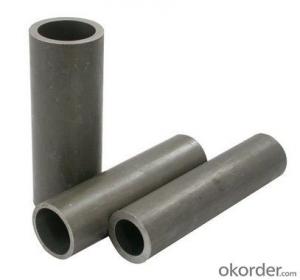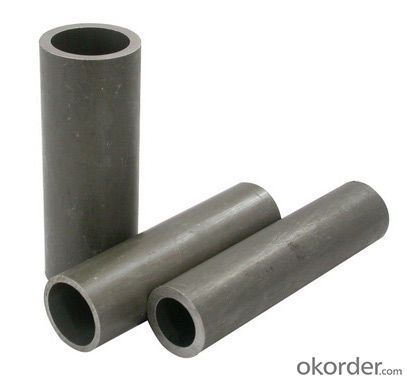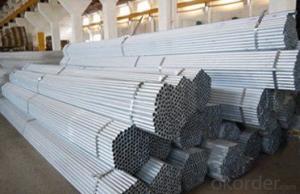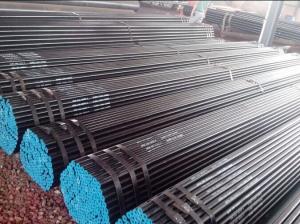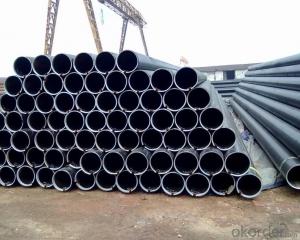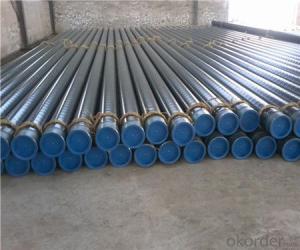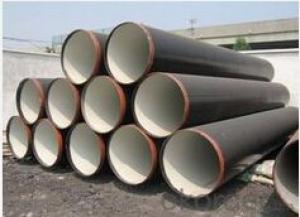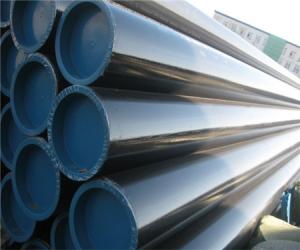Carbon Seamless Steel Pipe API 5L of 4 Inch
- Loading Port:
- China main port
- Payment Terms:
- TT OR LC
- Min Order Qty:
- 25 m.t.
- Supply Capability:
- 5000 m.t./month
OKorder Service Pledge
OKorder Financial Service
You Might Also Like
Carbon Seamless Steel Pipe API 5L of 4 Inch
Product Description:
Structure:
Seamless pipe is formed by drawing a solid billet over a piercing rod to create the hollow shell.
As the manufacturing process does not include any welding, seamless pipes are perceived to be stronger and more reliable.
Historically seamless pipe was regarded as withstanding pressure better than other types, and was often more easily available than welded pipe.
Main Features:
• High manufacturing accuracy
• High strength
• Small inertia resistance
• Strong heat dissipation ability
• Good visual effect
• Reasonable price
Specifications:
Standard | GB, DIN, ASTM |
Grade | 10#-45#, 16Mn |
Thickness | 8 - 33 mm |
Section Shape | Round |
Outer Diameter | 133 - 219 mm |
Place of Origin | Shandong, China (Mainland) |
Secondary Or Not | Non-secondary |
Application | Hydraulic Pipe |
Technique | Cold Drawn |
Certification | API |
Surface Treatment | factory state or painted black |
Special Pipe | API Pipe |
Alloy Or Not | Non-alloy |
Length | 5-12M |
Outer Diameter | 21.3-610mm |
Grade | 20#, 45#, Q345, API J55, API K55, API L80, API N80, API P110, A53B |
Standard | ASME, ASTM |
1) Material:20#(ASTM A 106/A53 GRB.API5LGRB,GB),45#,16Mn,10#.
2) Specification range:OD:21.3-610mm,WT:6-70mm,length:6-12m or according to the requirement of clients.
3) Excutive standards:GB,ASME API5L.ASTM A 106/A53,Despite of the above standards,we can also supply seamless steel pipe with standard of DIN,JIS,and so on,and also develop new products according to the requirements of our clients!
4) Surface:black lacquered,varnish coating or galvanized.
5) Ends:Beveled or square cut,plastic capped,painted.
6) Packing:bundles wrapped with strong steel strip,seaworthy packing.
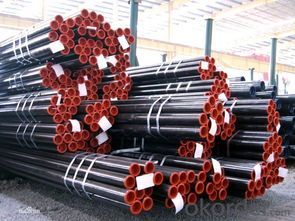
- Q: Are steel tubes and round steel in weight or length when purchased?
- The price must be measured by weight, and the length, volume and other specifications should be entered
- Q: Can steel pipes be used for oil and gas well production?
- Yes, steel pipes are commonly used for oil and gas well production due to their high strength, durability, and resistance to corrosion.
- Q: What are the specific differences between flexible pipes and rigid pipes?
- Structurally:A rigid waterproof sleeve is welded with a water stop ring outside the steel pipe;The flexible waterproof casing pipe is welded on the outside of the 3 side wing ring, 4 screw buckle, inside a welding piece with a rubber ring, the outside and do a flange, with 4 double head bolt, welding a steel pipe, the pipe installed, the flange is installed. The screw fastening, tightening the apron is bigger, more Water Leakage, generally in the waterproof requirements of relatively high places, such as the pool of water.
- Q: What are the safety precautions while working with steel pipes?
- When working with steel pipes, it is important to follow several safety precautions. Firstly, always wear protective gear such as gloves, safety glasses, and steel-toed boots to prevent injuries. Secondly, ensure that the work area is properly ventilated to avoid inhaling harmful fumes or gases. Additionally, use caution when handling heavy pipes to prevent strains or sprains. Lastly, be mindful of potential hazards such as sharp edges, hot surfaces, or falling objects, and take appropriate measures to minimize risks.
- Q: The outer circle of a seamless steel pipe 50 head into the outer circle of the 40 to close
- That is, according to the production process of different classification, different from hot rolling (expansion) pipe. In the process of expanding the tube or raw material tube, it is processed by multiple cold drawing, usually on single chain or double chain cold drawn machine of 0.5 ~ 100T. Cold rolled steel pipe (DIAL) in general, steel pipe for low and medium pressure boiler tube, high-pressure boiler steel pipe, alloy steel pipe, stainless steel pipe, oil cracking tube, machining pipe, thick wall pipe, small diameter and cold drawn steel tube also includes other tubes, carbon thin-walled steel, alloy thin-walled steel pipe, stainless steel pipe, special-shaped wall steel pipe. The outside diameter of cold drawn steel tube wall thickness to 6mm, to 0.25mm, to 5mm diameter thin-walled tube wall thickness is less than 0.25mm in size, accuracy and surface quality were significantly better than the hot (expanding) tube, but by the process control, its diameter and length are limited.
- Q: Can steel pipes be used for natural gas processing plants?
- Yes, steel pipes can be used for natural gas processing plants. Steel pipes have excellent strength and durability, making them suitable for transporting and processing natural gas. They can withstand high-pressure conditions and are resistant to corrosion, providing a safe and reliable option for gas processing facilities.
- Q: How are steel tubes represented?
- Galvanized pipe: InchSeamless steel tube, welded pipe, nonferrous metal pipe, etc.: outer diameter x wall thickness
- Q: How are steel pipes used in the construction of railway tracks?
- Steel pipes are commonly used in the construction of railway tracks as they provide a strong and durable foundation. These pipes are usually used as support structures for the tracks, serving as a base on which the rails are laid. They help to distribute the weight of the trains evenly, ensuring stability and reducing the risk of track failure. Additionally, steel pipes are used for drainage purposes, allowing water to flow freely and preventing damage to the tracks.
- Q: How are steel pipes made?
- Steel pipes are made through a process called pipe manufacturing, which involves several steps. First, raw materials such as iron ore, coal, and limestone are melted in a blast furnace to produce molten iron. The molten iron is then mixed with recycled steel and processed in a basic oxygen furnace or electric arc furnace to refine its composition and remove impurities. Once the desired steel grade is achieved, it is cast into billets, which are heated and pierced to form a hollow cylindrical shape. These pierced billets are then elongated and shaped into pipes through a process called hot rolling or cold drawing. Finally, the pipes undergo various finishing operations, such as straightening, cutting, and inspection, before being ready for use in various applications.
- Q: What are the factors to consider when selecting a steel pipe for a specific application?
- When selecting a steel pipe for a specific application, several factors need to be considered. These include the type of fluid or gas being transported, the pressure and temperature conditions, the size and dimensions required, the desired corrosion resistance, and the overall budget for the project. It is also crucial to assess the pipe's material properties, such as its strength, ductility, and toughness, to ensure it can withstand the operational demands of the application. Additionally, factors like the pipe's manufacturing process, compatibility with joining methods, and any specific industry standards or regulations should be taken into account.
Send your message to us
Carbon Seamless Steel Pipe API 5L of 4 Inch
- Loading Port:
- China main port
- Payment Terms:
- TT OR LC
- Min Order Qty:
- 25 m.t.
- Supply Capability:
- 5000 m.t./month
OKorder Service Pledge
OKorder Financial Service
Similar products
Hot products
Hot Searches
Related keywords
